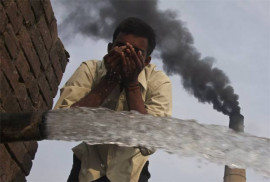Talking to The Express Tribune, Dr Baseer Achakzai, director of nutrition at the Ministry of National Health Services, Regulation and Coordination (NHSRC), said it is estimated that every year 360,000 to 400,000 children die in Pakistan from different causes. Some 45% of these children die of malnutrition alone. He said a two-month fortification course with multiple micronutrient powders (MMP) costs around Rs100 to Rs300 for the full coverage of one child.
He said according to a recent survey titled “Multiple Micronutrient Nutrient Powder “carried out by Aga Khan University Hospital revealed that MMP has helped to reduce 26% anemia in children which earlier stood at 51%. “Therefore the government can save many innocent lives by distributing sachets of MMP through lady health workers for every child between the ages of six months and five years to combat chronic malnutrition, which is affecting lives of our future generation,” he said.
Dr Achakzai claimed that the authorities in Punjab are looking forward to distributing these sachets through lady health workers from June this year.
Ayub Sheikh, health secretary at the NHSRC Ministry, pointed out that “micronutrient deficiency prevalence is a matter of great concern” in addition to overall malnutrition in children and women in Pakistan.” He was speaking at a seminar on micronutrients. “This significantly small amount can save our children from possible micronutrient deficiencies and improve their physical and cognitive development,” he said. He said a lot has been said and expressed about the status of malnutrition in the country, since the launch of the National Nutrition Survey 2011 less than two years ago.
“Today when I hear news like this I really feel bad. I strongly feel, as someone said, that it is time to stop talking and do some good work for the people of our country especially women and children,” he said.
He called upon UN agencies, donors and development partners to come forward and support the nutrition programme in the country with synergies in efforts to address the poor indicators of Stunting, low birth weight, anemia and IDD disorders.
Dr Tausif Akhter, country director of Micronutrient initiative (MI), said these small sachets contain necessary vitamins and minerals used to fortify the food of six to 24 month old children, He reiterated that this crucial period of 1,000 days provided us with a window of opportunity.
Published in The Express Tribune, May 31st, 2015.

1727177459-0/BeFunky-collage-(6)1727177459-0-165x106.webp)


1732694983-0/BeFunky-collage-(1)1732694983-0-165x106.webp)












COMMENTS (1)
Comments are moderated and generally will be posted if they are on-topic and not abusive.
For more information, please see our Comments FAQ